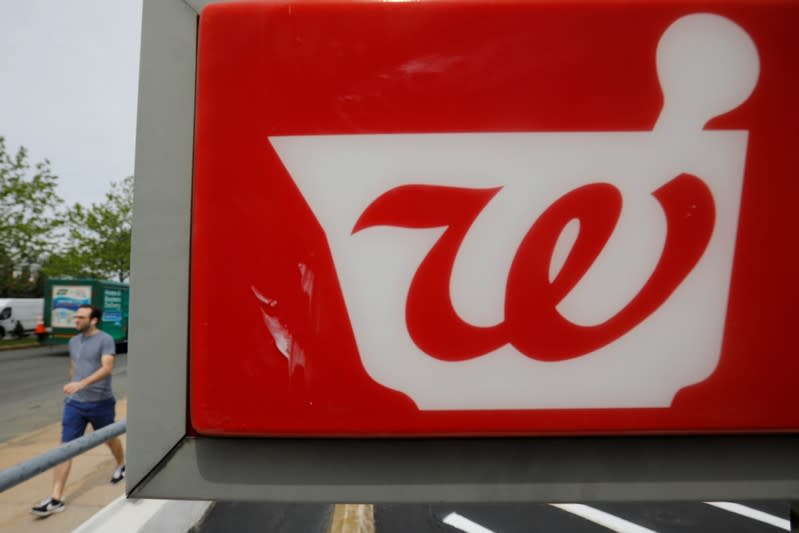Exclusive: Walgreens has explored taking drug store chain private - sources
By Greg Roumeliotis and Mike Spector
(Reuters) - Walgreens Boots Alliance Inc <WBA.O> has been exploring whether to go private following private equity interest in the U.S drug store chain, which has a market value of more than $55 billion, according to people familiar with the matter.
In recent months, Walgreens has held preliminary discussions with some of the world's largest private equity firms about putting together what would be the biggest ever leveraged buyout, the sources said.
Walgreens has tasked investment bank Evercore Partners Inc <EVR.N> with exploring whether a transaction can be put together, the sources said, cautioning that a deal is far from certain.
Many private equity firms have pushed back on the idea, concerned about Walgreens' business prospects and the challenges of financing the deal, the sources added.
A leveraged buyout of Walgreens would likely require participation of several private equity firms, each writing large checks, at a time when many of them have lost their appetite for teaming together on so-called club deals. Many of those takeovers were completed during a boom preceding the 2008 financial crisis and subsequently struggled or collapsed.
Walgreens Chief Executive Stefano Pessina, who is the company's largest shareholder with a 16% stake, could roll his equity into the deal to help finance the transaction, one of the sources said.
Walgreens has also contemplated divesting some of its assets, such as its 27% stake in drug wholesaler AmerisourceBergen Corp <ABC.N>, to provide more funding, one of the sources added.
The sources asked not to be identified because the matter is confidential. Walgreens and Evercore declined to comment.
Walgreens shares rose 8% to $64.12 in New York after Reuters was first to report the news on Tuesday. It later gave back some of those gains and was up about 3%. The stock had lost 28% of its value in the last 12 months, compared to a 13% rise in the S&P 500 Index <.INX>.
Walgreens' deliberations over going private reflect the challenges its business faces.
Last week, it warned it did not expect its adjusted earnings to grow in fiscal 2020 because of the low reimbursement rates for prescription drugs, especially generics, and competition from online retailers such as Amazon.com Inc <AMZN.O>.
The Deerfield, Illinois-based company, which operates Walgreens and Duane Reade pharmacies in the United States and Boots in Britain, has been closing stores and launching cross-selling partnerships with companies such as grocer Kroger Co <KR.N> and weight loss clinic operator Jenny Craig, as it seeks to cut costs and boost its growth prospects.
Some analysts said that going private could allow Walgreens to avoid the prying eyes of Wall Street, and invest in its business and offerings without having to worry about quarterly earnings. But many questioned whether such a large leveraged buyout was possible.
"Given poor industry fundamentals, seemingly never-ending margin pressures faced in the healthcare supply chain, and, let's face it, ongoing uncertainty about unpredictable items such as opioids exposure, we would struggle to see a monster premium beyond this current run-up (in the stock)," Baird analyst Eric Coldwell wrote in a note.
DEALMAKING
Walgreens' approach toward alliances and joint ventures stands in stark contrast to the strategy of rival CVS health Corp <CVS.N>, which acquired U.S. health insurer Aetna Inc for $70 billion last year. CVS shares have performed better than Walgreens in the last 12 months, down about 7%.
In 2017, Walgreens dropped a $17.2 billion deal to buy smaller peer Rite Aid Corp <RAD.N> after failing to win U.S. antitrust approval. Instead, it agreed to acquire 1,932 Rite Aid stores, about 42% of its total. The retail footprint proved too big for Walgreens, which has been gradually closing some locations.
Last year, Walgreens explored other deals, including buying out the rest of AmerisourceBergen and buying a stake in U.S. health insurer Humana Inc <HUM.N>, as well as selling a stake to it. It did not pursue those transactions, although it has been expanding its partnership with Humana by providing primary care services and support for seniors inside Walgreens stores.
Pessina, 78, would not be the first company boss to be involved in talks to take his firm private. Dell Technologies Inc <DELL.N> CEO Michael Dell, for example, took the computer maker private in 2013 in a $24.9 billion deal backed by private equity firm Silver Lake. After a string of acquisitions, Dell returned to the stock market as a public company last year and now has a market value of $39 billion.
But Dell owned about three-quarters of his company at the time of the leveraged buyout, making its funding easier.
Last year, former Qualcomm Inc <QCOM.O> executive chairman Paul Jacobs briefly explored a long-shot bid to take the U.S. semiconductor company, which has a market capitalization of $103 billion, private.
(Reporting by Greg Roumeliotis and Mike Spector in New York; Additional reporting by Tatiana Bautzer in Sao Paulo; Editing by Rosalba O'Brien and Bill Berkrot)

 Yahoo Finance
Yahoo Finance 

